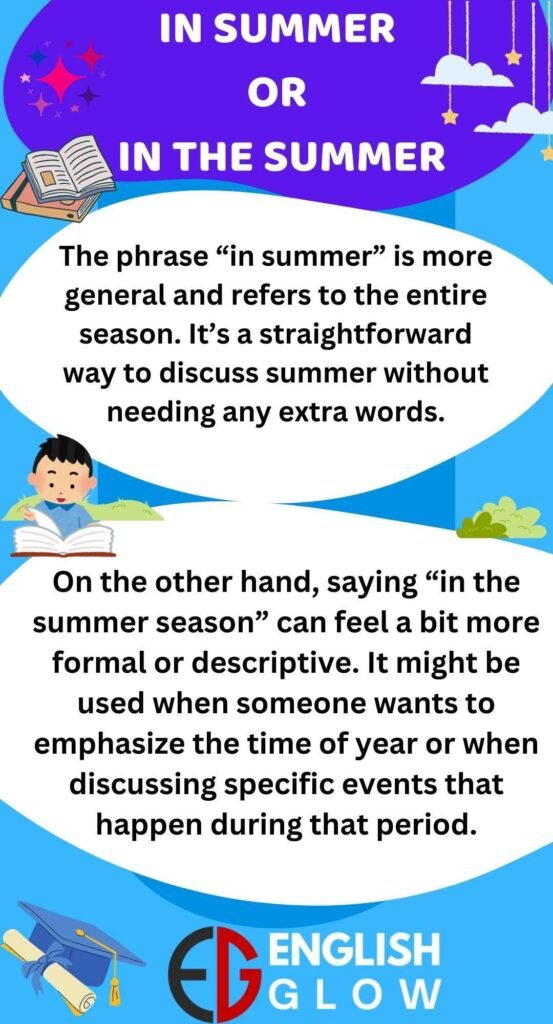When we talk about the phrases “in summer” and “in the summer,” it can sometimes be confusing. Both forms are correct, but they can have different meanings depending on the context. Generally, “in summer” refers to the season as a whole. It’s a broader phrase that people use to talk about all summer experiences. On the other hand, “in the summer” can refer to a particular summer or specific events during that time. For instance, you might say, “I plan to travel in the summer,” which suggests you have a specific summer in mind.
From what I’ve learnt, the people use these phrases can differ between cultures. An American teacher once mentioned that many Americans tend to say “in the summer” more often. This might be because they prefer the definite article, making it sound more natural in their speech. On the flip side, some British people might use “in summer” without the article, which is also correct but less common. This shows how language can vary based on custom and location.
There’s no strict rule about which form to use, and both phrases have their place in conversation. It may be helpful to listen to how others use them and adapt your language accordingly. I think it’s fascinating how language evolves, and how preferences can change over time. As we navigate through different seasons, understanding these subtle differences enriches our communication and enhances our experience of the world around u
When to Use “In the Summer Season” Instead of In the Summer
When we look at the phrases “in the summer season” and “in summer,” there are subtle differences in how they are used. The phrase “in summer” is more general and refers to the entire season. It’s a straightforward way to discuss summer without needing any extra words. On the other hand, saying “in the summer season” can feel a bit more formal or descriptive. It might be used when someone wants to emphasize the time of year or when discussing specific events that happen during that period.
For example, you might hear someone say, “I love to go to the beach in summer,” which sounds casual and relaxed. In contrast, someone could say, “I enjoy swimming in the summer season,” which might come across as more formal. It’s interesting how the choice of words can change the tone of a sentence. In everyday conversation, most people tend to use “in summer” more often, as it’s simpler and easier to say.
From my experience, it’s important to consider your audience and the context when choosing which phrase to use. If you’re talking casually with friends, “in summer” fits well. However, if you’re writing something more formal or academic, “in the summer season” might be more appropriate. Overall, both phrases are correct, but their usage can reflect the style and tone of your communication.
Season is used in these contexts; however, the word season is often used in various contexts, and it can describe different times of the year. When we talk about the four seasons—spring, summer, autumn, and winter—we are looking at how each one brings its own unique experiences and activities. For example, the summer season is often associated with the holiday season, where people enjoy outdoor activities, vacations, and spending time at the beach. In this sense, the term “season” captures the essence of the time of year and its impact on our behaviour and lifestyle.
In conversations, the phrase “in summer” is a more general term. It can be used casually to refer to any time during the summer months. However, when we use “the summer season,” it sounds more formal and may be used in literary or academic contexts. This distinction is important because it reflects how we associate certain activities or events with specific seasons. For instance, closing retailers often change their stock of clothes to reflect the lighter styles for summer and heavier clothing for autumn.
Using the right phrase can emphasize the specificity of what you are talking about. If you are discussing activities that happen only during a particular summer, saying “in the summer” makes it clear. In contrast, when you want to talk about summer in a broader sense, “in summer” works just fine. Understanding these nuances can help you communicate more effectively and convey your ideas clearly.
you might enjoy reading: Too Short or To Short? Discover the Common Mistake You’re Likely Making!
Which is Correct: “On a Hot Summer Day,” “Summer’s Day,” or Summers Day?
When we inquire, “Is it ‘on a hot summer day,’ ‘summer’s day,’ or ‘summers day?’” we must consider how we use these expressions. The phrase “on a hot summer day” is the simplest.. It uses adjectives to describe the type of day we are talking about. This phrase helps set the scene, letting people know that it’s a warm day in the summer season. In contrast, “summer’s day” is correct because it uses the possessive form, indicating that the day belongs to summer. This gives a more poetic feel to the phrase.
On the other hand, “summers day” is incorrect because it lacks the apostrophe. Without the apostrophe, it becomes plural, which doesn’t fit the meaning we want. For instance, if someone says, “I have enjoyed many summers of fun at the lake,” they are talking about several summers rather than a specific day. This shows how important the use of words is in defining what we mean.
In conversations, you might hear both phrases being used differently. “on a hot summer day” might be common in everyday speech, while “summer’s day” feels more formal or literary. Understanding the differences helps us communicate clearly, whether we are talking about the beauty of summer or just describing a typical hot day.
What is the meaning and sentence of “summer”?
The word summer refers to the warmest season of the year, typically lasting from June to September in the north and from December to March in the south. This time is known for hot weather, making it a popular season for vacations and outdoor activities. People often enjoy activities like swimming, barbecuing, and going to the beach during this period. For example, when I think of summer, I remember having breakfast on the balcony while enjoying the sun.
In addition to being a time for fun, summer is also associated with travel. Many families take trips during this season. For instance, last summer, my friends went to Australia, and two summers ago, they explored Brazil. These trips are exciting because summer provides a chance to experience new places and cultures. The phrase “in the summer” is often used to refer to events or plans during this warm season, while “in summer” is a more casual way to express the same idea.
Understanding the meaning of summer helps us appreciate its significance in our lives. It marks a break from school for many students and brings opportunities for family bonding and adventure. Whether you’re spending time with friends or relaxing at home, summer is a special time that many people look forward to each year.
you might enjoy reading: Is It Correct to Say ‘Have a Good Night’? Discover the Surprising Truth!
FAQ
Do you write “in the summer” or “in summer”?
Both are correct, but “in the summer” is more specific, referring to a particular summer, while “in summer” is more general, referring to the season as a concept.
What is the difference between “in summer” and “in the summer”?
“In summer” is used when speaking about the season in general terms, such as a habitual action (“It gets hot in summer”). “In the summer” refers to a specific summer or a specific event during the summer (“In the summer of 2022, we went to the beach”).
Which is correct: “summer” or “the summer”?
Both can be correct depending on the context. “Summer” without the article is used when speaking about the season in general, while “the summer” refers to a particular summer or event within a summer.
Is it “on” or “in summer”?
The correct preposition is “in summer.” We use “in” for seasons. For example, “We go on vacation in summer.” “On summer” would be incorrect in this context.





